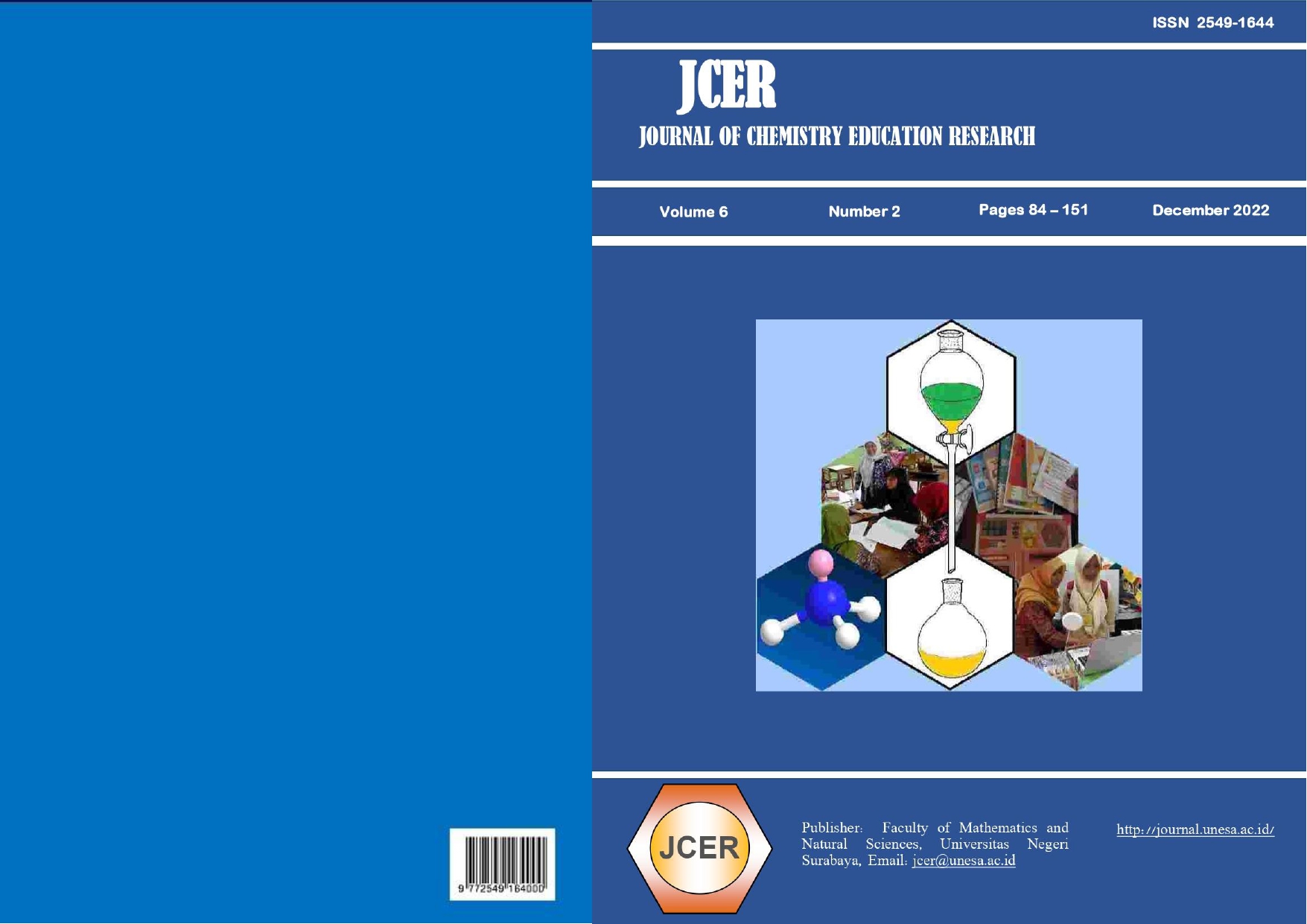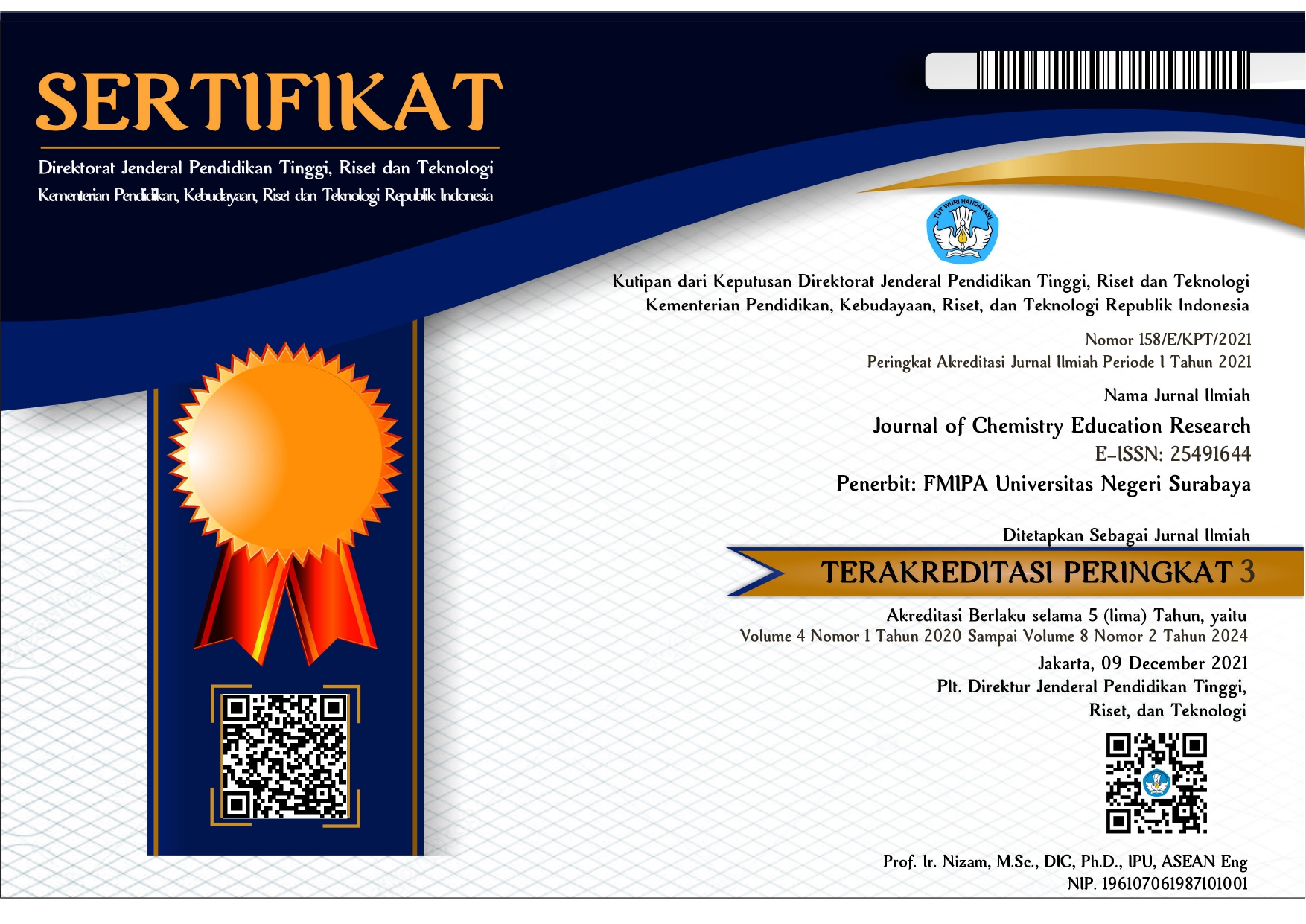THE LEGEND OF THERMO GAME BASED COMPUTER AS INSTRUCTIONAL MEDIA ON THERMOCHEMICAL FOR IMPROVE CURIOSITY
DOI:
https://doi.org/10.26740/jcer.v6n2.p84-92Keywords:
Learning Media, Curiosity, Thermochemistry, GameAbstract
This research aims to obtain the learning media as a game of thermochemistry that can improve the curiosity of high school students using The Legend of Thermo game. The Borg and Gall development research model is used as a Research and Development (R&D) method. This model has ten stages which are useful for produced a viable learning media. The result of the validity value is 95.14% with a very valid category. The results of the questionnaire responses of students value is 86.26% with a very practical category. The results of the curiosity assessment of learning students obtained 90.33% with the category of very effective. The significant value of the pretest results obtained 0.200 and posttest results obtained 0.128 which is more than 0.05 so the data are normally distributed. In the Paired Sample t-Test obtained a significant value of 0,000 which is less than 0.05 so there is a significant difference between the pretest and posttest scores. Based on the description above, The Legend of Thermo game is appropriate to be used as a learning media on Thermochemical material based on the criteria of validity, practicality, and effectiveness.
References
Kemendikbud. 2013. Kerangka Dasar Kurikulum 2013. Jakarta: Kementrian Pendidikan dan Kebudayaan Direktorat Jenderal Pendidikan Dasar.
Delors, J. 1996. Learning: The treasure within. Report to UNESCO of the international commission on education for the twenty-first century. Paris: UNESCO.
Mustari, M. 2014. Nilai Karakter, Refleksi untuk Pendidikan. Jakarta: Rajawali Press.
Loewenstein, G. 1994. The Psychology of curiosity: A review and reinterpretation. American Psychological Association, Inc. Psychological Bulletin, vol 116(1), pp 75-98.
Lutfi, A., & Nugroho, A.P. 2019. Minat Belajar dan Keberhasilan Belajar Partikel Penyusun Atom dengan Media Pembelajaran Permainan CHEM MAN. Jurnal Pembelajaran Kimia, vol 4(1), pp 39-50. Malang: Universitas Negeri Malang.
Sugiyono. 2012. Metode Penelitian Kualitatif dan R&D. Bandung: Alfabeta.
Borg, W.R. & Gall, M.D. 1989. Educational Research: An Introduction, Fifth Edition. New York: Longman.
Plomp, T., & Nienke, N. 2013. An Introduction to Educational Design Research. Netherland: Institute for Curriculum Development.
Susilana, Rudi. 2009. Media Pembelajaran Hakikat, Pengembangan, Pemanfaatan dan Penilaian. Bandung: CV Wacana Prima.
Widayanti, F. D. 2013. Pentingnya Mengetahui Gaya Belajar Siswa dalam Kegiatan Pembelajaran di Kelas. ERUDIO, vol 2(1), pp 7-21. Malang: Universitas Wisnuwardhana.
Sadiman, A. S. 2010. Media Pendidikan. Jakarta: Raja Grapindo.
Lutfi, A., Suyono., & Nur, Mohamad. 2014. Penilaian Permainan Bersarana Komputer Sebagai Media Pembelajaran Ilmu Pengetahuan Alam. Surabaya: Prosiding Seminar Nasional Jurusan Kimia Universitas Negeri Surabaya.
Zorica, M. B. 2014. Edutainment at the Higher Education as an Element for the Learning Success. Proceedings of EDULEARN14 Conference, Barcelona, Spain, pp 4089-4097. Croatia: Department of information and Communication Sciences, Faculty of Humanities and Social Sciences, University of Zagreb.
Adams, E. 2010. Fundamentals of Game Design (2nd ed). Berkeley, California: Pearson Education.
McGuire, M., & Jenkins, O.C. 2008. Creating Games: Mechanics, Content, and Technology. Boca Raton, Florida: CRC Press.
Burgos, D., Van Nimwegen, C., Van Oostendorp, H., & Koper, R. 2007. Game-based learning and the role of feedback: A case study. Advanced Technology for Learning, vol 4(4), pp 188-193.
Richter, G., & Daphne, R. 2012. Schedules of Reinforcement and Game Experience. Proceedings of the Seventh Mediterranean Conference on Information Systems MCIS 2012, vol 35.
Ilyasa, D.G., & Dwiningsih, K. 2019. The Validity of Interactive Multimedia on Ionic Bond Matter. Journal of Chemistry Education Research, vol 3(2). Surabaya: Universitas Negeri Surabaya.
Sari, A.P., & Setiawan, A. 2018. The Development of Internet-Based Economic Learning Media using Moodle Approach. International Journal of Active Learning, vol 3(2), pp 100-109.
Stokoe, R. 2012. Curiosity, a condition for learning. The International Shcools Journal, vol 32(1), pp 63-66, diakses pada tanggal 8 Mei 2020 https://www.questia.com/library/journal/1P33009007551/curiosity-a-condition-for-learning.
Aprianto., & A. Lutfi. 2018. Development of The Adventure Of Element Based On Role Playing Game As A Learning Media On Element
Chemistry Matter. Proceedings of the Seminar National Kimia National Seminar on Chemistry. Advances in Engineering Research, vol 171, pp 223-228. Atlantis Press.
Hidayah, I. A., Lutfi, A., & Rusly, H. 2019. Use of Compurized Games on Chemistry Learning. Proceedings of the Seminar National Kimia National Seminar on Chemistry. Atlantis Highlights in Chemistry and Pharmaceutical Sciences, vol 95, pp 192-196. Atlantis Press.
Lutfi, A., Suyono., & Hidayah, E.R. 2019. Edutainment with Computer Game as a Chemistry Learning Media. Jurnal Penelitian Pendidikan Sains, vol 8(2), pp 1684-1689.
Downloads
Published
Issue
Section
License
Copyright (c) 2022 JCER (Journal of Chemistry Education Research)

This work is licensed under a Creative Commons Attribution-NonCommercial 4.0 International License.
 Abstract views: 275
,
Abstract views: 275
, PDF Downloads: 335
PDF Downloads: 335



